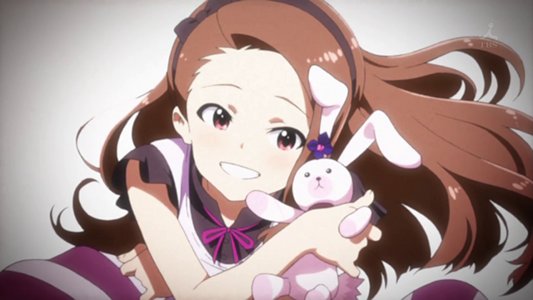Stuffed dress sequence was a bit painful; poor Aroduc. And frankly, the storyline of finding one's natural side was far too simplistic. I ended watching it for pure fanservice (pictured).

On second thought, there was probably no other reason to watch this anime to begin with. I am happy for Iori's self-discovery and all, but on the other hand, if you are schooled in the basics of your trade by Miki, the resident airhead, you need to rethink your life. By the way, it was revealed in ep.1 that Iori was accepted into her job by nepotism. All this paints a rather bleak picture, which even KugiRie is powerless to brighten.
Now I'm getting a little concerned that we're going to see the back side of every cast member, episode after episode, and god knows each has internal demons to wrestle. That is going to make for a rather pale series.
It does not take a lot of Japanese knowledge to read "such-and-such Summer Festival Mini-Live" in the preview (on the whiteboard that Ritsuko slaps in her enthusiasm). Pray for an insert, everyone.
UPDATE: Kuro writes:
I liked the episode for the “showing our individuality via photo shoots” part. It did give us a lot of nice eyecandy of everyone, but the focus on Iori’s efforts to highlight her individuality ironically painfully shows how unsuitable she is for this line of business.
Indeed. If I may refer again to 2DT+Yi double feature:
Idols in Japan are tautologies of fame. Sure, sometimes they sing and dance, or do seiyuu work []. But in the end, we mustn’t forget that they’re famous because they’re famous. They’re propelled mostly by personality, and by the dreams that those personalities sell.
It may be time for Iori to embrace the dream of marrying into money. Although...

UPDATE: Zyl comments:
On Author’s observation that Iori was accepted on the basis of nepotism, my guess is that Iori’s previous failures to get signed on as an idol-trainee was not due to any lack of the minimum amount of talent or personality (the bar seems to be set too low for that) but simply due to corporate ladder self-preservation and risk minimization – it’s much easier to turn her away than to have to constantly worry about keeping the boss’s daughter sweet or at least not seriously pissing her off.